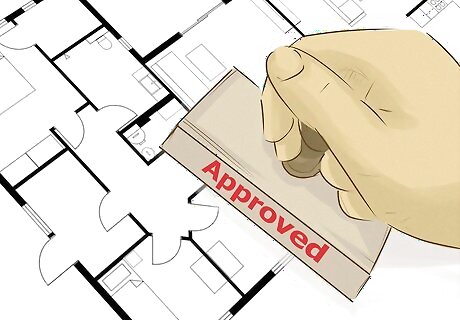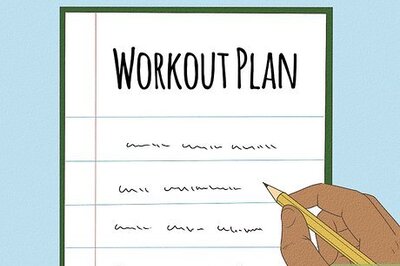
views
Scouting out Architects

Ask someone doing a home project for an architect recommendation. If you know someone whose home has recently undergone major construction work, an architect was probably used. Check with the property owner to see if the architect was easy to work with, what areas they work best in, and what their rates are. You'll also want to know if the project was completed on time and if the architect stayed within budget. If not, find out why, as sometimes timelines and budgets go over due to unforeseen obstacles, and not bad decision-making by the architect. Ask the architect who worked on the project if they would listen to a quick pitch of your project to see if they’re interested. If not, ask if they could recommend any other architects who might be.

Search online for architects who can provide the services you need. Websites like cmdgroup or bark.com host databases of hirable architects and firms. They’ll often have their portfolio work up to see, a link to their website, and a means of contact. You can look up specific services, or combinations of services you want done, such as flooring, land surveying, historic restoration and preservation, kitchen and bath design, etc., and then the firms that specialize in it. Often sites with directories just for your state or even city can be found, allowing you to find local work.

Use the American Institute of Architects resource tools to look up a local architect or firm. The AIA has directories of specific architects and firms in different cities around the country and the projects they’ve completed. Their search tool allows you easily find any firm that is members with them in your given zip code, along with their address and form of contact. Often your local city will have its own AIA website. Their directories often cater to architects and firms working in the style of buildings in your area, and services more needed there (i.e heating/AC in hotter and colder climates, waterproofing in places prone to floods, etc.) A link to the main AIA website can be found here: https://www.aia.org/.

Look through design magazines for ideas and the names of architects. Aside from helping you to see popular trends and inspirations for your own design, magazines can help you learn more about who’s currently working and being contracted. Look up the websites for architects whose designs strike you, seeing what their rates are, and how long their waitlist is.
Interviewing Potential Hires

Review the architect's building portfolio. They should have a wide variety of projects to express their range of design abilities. Look for elements that you would want to include in your own project, such as window placement and room layouts. During the interview, ask the architect’s opinion on what they might want to add to the design themselves, or what style they’d take influence from. Look for any qualities or flourishes unique to that architect, and consider hiring them if you would want to have those for yourself.

Be communicative and candid about your wants for the design. Being able to treat the architect as a partner, and not feeling as though you can’t trust them to carry out your vision, or understand what you’re saying, will be some of the most important factors to consider while hiring. Having good communication, especially early on in the process, will help to foster a strong work dynamic with you and the architect. Don’t be afraid to state your opinion on any ideas or concerns you may have. Giving feedback to let them know what you would or wouldn’t like to see will make things easier for you both, and help them cater to your wants better.

Inquire about how they’ll manage implementing your ideas for the project. Listen to their initial response to your proposal to see if it’s in line with your vision. If it sounds like it is, ask the architect what they’ll be able to produce during the design and conceptual phases of the project as signs of development in this direction. Talk to them about budgeting concerns for carrying this out, saying “If a project you worked on went over budget, why did it happen, and how did you end up resolving the problem?”

Ask for comparable references to your project. If you haven’t already seen them, ask the architect to show you any work they’ve done that might be similar or have applicable design elements to the work you’re wanting done. If they do, ask how they might be able to include those same ideas here, and what challenges that may bring. Ask them, “Have you had any problems carrying out other’s design ideas? What are some I may face?” Remember to keep in mind the scope of the budget when talking about adding extra elements.

Find out how much you’ll be involved in the development process. As their client, there will be periods where the architect will need your direct consultation, either on how you may want something to look, in regards to how to handle issues that arise, or perhaps on what material to use, as well as others. Be sure you know beforehand how much of your time will be needed by the architect. Question them, “How much will I personally be involved with the work?”

Verify that you will work directly with the architect you are interviewing. Larger firms sometimes send lead architects to initial meetings, but later assign a junior architect to work with clients after they’re hired. Make it a strong point during the interview to find out and say “Who exactly will you be sending to work with me for this project?” Negotiate terms if you feel dissatisfied by the answer. Be courteous and understanding towards their choices of assigning who will be working with you, but stress the need to start proper communication with the architect to make sure they’re compatible for what you need.
Discussing Services

Work out an agreed upon cost or rate for the architect’s services. Describe how much money you have for the project, and find out whether your scope is viable within your budget. A good architect won’t lie to you about the estimated cost of a project. Rather, negotiate and determine what they’ll be able to do for you with the budget you have. Always have extra funding set aside for construction project overruns. Generally, 25 percent more money is enough to cover extra expenses.

Choose what specific services you want the architect to provide. During your interview you should’ve found out how much involvement the architect wants to have in your project. If you have additional needs, such as the assistance of someone who can navigate the process of applying for construction permits with your town, make sure the architect is aware of your needs. Some architects include project management in their fee structure, others consider it an extra service and charge accordingly.

Be aware of building codes the architect will have to follow. Among the architect’s responsibilities is making sure the hired contractors and subcontractors are not only building your project to your specifications and timeline, but also to local building codes and guidelines. Keep in steady communication with your architect to learn about any concerns that may arise.

Make sure the architect is working to save you money. If you’ll be building in locations where extreme weather occurs (hurricanes, floods, earthquakes), it could lead to property damage that requires costly repairs to fix. In these instances, the architect may have areas of the project built “above code,” or to a higher standard of protection than a standard code job, to make sure it will last over the years. Having your project built above code may potentially earn you discounts on your insurance premiums. You may not always need areas of your project made above code, but you should talk to the architect about it if you live somewhere prone to certain natural disasters (i.e floods, hurricanes, high winds, etc.). You should also build above code if the space will be heavily used, such as a floor being reinforced for additional weight if many people will frequently be in a room.




















Comments
0 comment